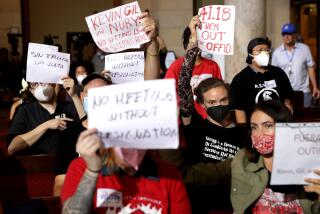Bush Seeks Support of Mayors for His Faith-Based Initiative
- Share via
DETROIT — President Bush, seeking to defuse criticism that has virtually derailed his faith-based initiative in Congress, called on U.S. mayors Monday to support the plan that would expand the role of religious groups in providing the nation’s social services.
Bush pledged that taxpayer money would finance needed social programs--and not religious indoctrination, as critics fear--and argued that his goal was to let faith-based organizations compete on equal footing with other providers of social services.
“We recognize that the funds will be spent on social services, not worship services,” Bush told the U.S. Conference of Mayors, which issued a proclamation in support of the effort.
Yet key parts of the initiative, which has become one of Bush’s paramount domestic goals, appear to be in jeopardy. On the right, conservative evangelicals fear new bureaucratic mandates on their programs and have expressed concerns that the White House plan also would include less-traditional religions, ranging from the Church of Scientology to the Nation of Islam.
On the left, others have worried that it would erode the nation’s barrier between church and state.
“We respect the separation of church and state, and the constitutional rights of religious people,” Bush declared Monday. “But the days of discriminating against religious institutions simply because they are religious must come to an end if we want to heal America.”
But Bush’s bid to infuse his beleaguered initiative with new life made few inroads Monday on Capitol Hill, where observers said the president’s remarks were vague and failed to address important concerns.
Democrats in particular are worried that faith-based providers would proselytize members of the public, in effect using taxpayer money to gain converts. Also, critics say it is not appropriate for religious groups, who already have some legal rights to discriminate in hiring, to practice discrimination while receiving government grants.
Political observers said the faith-based initiative has little chance of passing Congress until these and other areas of dispute have been addressed.
“To answer these concerns, we need a loud and clear message from the White House,” said Dan Gerstein, spokesman for Sen. Joseph I. Lieberman (D-Conn.), who has emerged as an influential Democrat on the issue. “And that just hasn’t been delivered yet.
“No one’s in any rush to get to this over here [in the Senate]. . . . We may have to wait till the fall--or later.”
Further complicating the initiative’s prospects in Congress is the Democrats’ recent takeover of the Senate. The new Senate majority leader, Tom Daschle of South Dakota, while not highly visible on the faith issue, is believed to share many of the concerns voiced by others in his party.
For its part, the White House has focused its efforts on the House, where administration officials have quietly discussed refinements of the plan to help gain support. For example, they have discussed provisions to ensure that faith-based organizations would have to keep government money in a separate account from their religious activities.
Testifying before the Senate Judiciary Committee earlier this month, a Justice Department official said that his own department would approve of restrictions preventing government funds from being used for religious instruction, worship or proselytization.
“If the religious organization offers such an activity, it shall be voluntary for the individuals receiving services and offered separate from the program,” testified Carl H. Esbeck, a senior counsel in the Justice Department.
Nonetheless, questions about the final White House posture on such matters last week helped knock the initiative off the agenda of two key House committees. House advocates had hoped to win passage of the plan as early as this week, but the prospects appear to be diminishing.
“As I have said all along, I am fully confident that the House will pass the faith-based bill later this summer,” said Rep. J.C. Watts Jr. of Oklahoma, chairman of the House Republican Conference and a leading advocate of the faith-based initiative.
Although Bush’s plan, often called “Charitable Choice,” has encountered broad resistance, it also has sparked some strong support.
Many African American churches and advocates of urban areas have expressed their support, seeing in it a new source of funding for their social initiatives. In a proclamation Monday, the mayors endorsed Bush’s goals and applauded the charitable work of religious groups, while declining to take a stand on the legislation in Congress.
Bush announced Monday that Rosa Parks, who in 1955 became a star of the civil rights movement when she refused to give up her bus seat to a white person, had endorsed his initiative. The president also cited Robert F. Kennedy’s admonition that in helping American cities, the involvement of those with the most at stake must be paramount.
Bush also spotlighted Head Start programs in religious settings, the work of Catholic Charities and the Salvation Army, and the use of Medicaid and Medicare money in religious hospitals as evidence for his approach.
“In all these cases, we are funding the good works of the faithful, not faith itself,” Bush said. “Do the critics of this approach really want to end these programs? I certainly hope not. It would be bad for America.”
Still, the political ambivalence surrounding the initiative was apparent even among the mayors, who responded to his comments with varying degrees of enthusiasm. When he pointedly urged the mayors to let the “skeptics in the United States Senate and . . . the United States House of Representatives” know of their support, the reception was less than enthusiastic.
*
RELATED STORY
Hahn Meets Bush: Mayor-elect takes Air Force One to Detroit. B1
More to Read
Get the L.A. Times Politics newsletter
Deeply reported insights into legislation, politics and policy from Sacramento, Washington and beyond. In your inbox twice per week.
You may occasionally receive promotional content from the Los Angeles Times.










